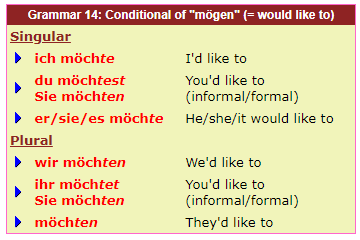Ich möchte...
The verb mögen ("to like") is unique amongst modal verbs in that it is the conditional form, and not the present tense, which is used with a following infinitive. We will deal with the present tense of the verb mögen and how it is used in the next chapter.

It translates as a more polite (and more restrained) way of saying "I want to" than "ich will". Thus in the final example below, it would appear rude to say: "Wollen Sie später noch mal anrufen?".
Ich will eine Nachricht hinterlassen.
(I want to leave a message.)
Ich möchte eine Nachricht hinterlassen.
(I would like to leave a message.)
Möchten Sie später noch mal anrufen?
(Would you like to ring back later?)
 英语
英语 日语
日语 韩语
韩语 法语
法语 西班牙语
西班牙语 意大利语
意大利语 阿拉伯语
阿拉伯语 葡萄牙语
葡萄牙语 越南语
越南语 俄语
俄语 芬兰语
芬兰语 泰语
泰语 丹麦语
丹麦语 对外汉语
对外汉语

